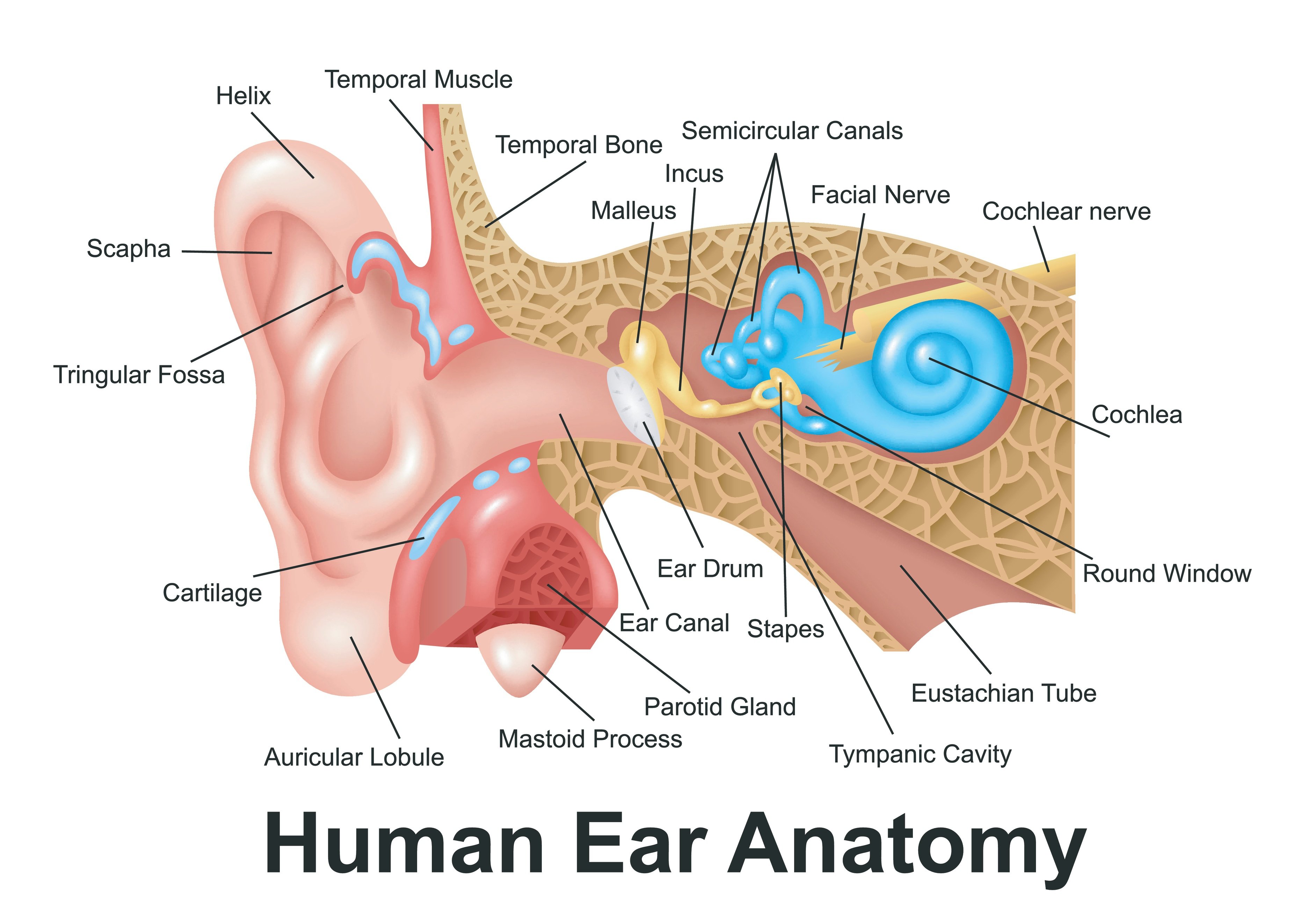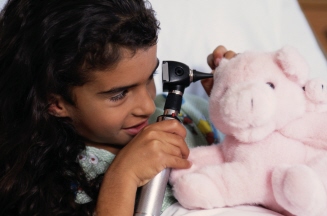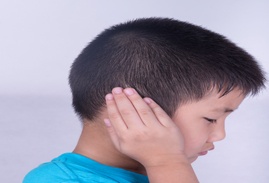- “Huh? What Did You Say?”
As parents, we all know that hearing and LISTENING are not the same. But, if it seems your child is experiencing hearing issues, even when it appears he/she is listening well, you should ask your child’s physician for an in-office hearing test or referral.
- Failed School Screening
School-aged children routinely have vision and hearing screenings conducted at school. Generally, parents are NOT notified unless there is a concern. If you receive a notice from your child’s school that he/she did not pass the hearing screening, please follow-up as the notice recommends.
- Teacher’s Report— Part I
Let’s face it, teachers spend A LOT of time with our children and are likely the first to notice if your child is experiencing hearing issues. Though, at times, it can be difficult to separate attention/focus from actual hearing ability, if your child’s teacher shares a concern, you should have it checked out.
- Teacher’s Report— Part II
Have you noticed a sudden drop in your child’s grades? Listening can be a tiring task when struggling with hearing. It can be easy for your child to “tune out” the teacher’s lessons, which can then impact his/her grades.
- “Why Is That Television So LOUD?”
Many kids like to raise the volume of the television. For some shows, like cartoons, it can make them seem more exciting and fun, but it could also be a sign that your child is experiencing hearing issues. If your child insists that he/she cannot hear the television at a level that you believe is typical, consider getting your child’s hearing tested.
- “Inside Voice, Please!”
Some hearing problems interfere with our ability to monitor the volume of our own voice. If your child seems to be talking either too loudly (or too softly), consider having his/her hearing checked.
- Recent Upper Respiratory Infection, Colds, Allergies, Flu
Anything that causes swelling in the back of the nose/throat area can cause secondary problems with middle ear health and hearing. Even if there is no fever or pain, your child could still have trouble hearing. If your child recently had a bad cold and, a couple of weeks later, seems to not be hearing well, have it checked.
- “I’m Hearing a Funny Sound!”
If a child reports any unusual noises in their head or ears (a ringing, rushing, roaring, beeping, hissing, etc.), particularly after being exposed to loud sound, have his/her hearing checked.
- Eagle Eyes
Children are marvelously adaptable to using what senses they can to figure out what’s going on and communicate! If you notice that your child seems unusually attentive to visual information and watching the faces of people speaking, have his/her hearing checked.
- “I Thought You Said…”
Does your child seem to mishear or misunderstand what was said? Some hearing problems are subtle and can interfere with hearing certain speech sounds. If this is happening, consider a hearing test.

Read More
Tags:
Communication,
Hearing,
Teens,
Hearing Loss
If your child has been diagnosed with a permanent hearing loss it’s likely that hearing aids have been recommended. Hearing aids can be life-altering for your child, allowing him/her to hear sounds often miss due to hearing loss. Hearing aids that are properly fitted early on can allow your child to develop speech and language skills to reach his/her full potential.
Read More
Tags:
Hearing Aid,
Hearing,
Hard of Hearing,
Hearing Loss,
toddler
Children learn to talk by listening to those around them. The first few years of life are a critical time for speech and language development. Children must be able to hear speech clearly in order to learn language. Fluctuating hearing loss due to repeated ear infections might mean the child doesn't hear consistently and may be missing out on critical speech information. Permanent hearing loss will also affect speech and language development, especially if it is not detected early. The earlier hearing loss is identified and treated, the more likely the child will develop speech and language skills on par with children who aren’t experiencing hearing issues.
Read More
Tags:
Speech,
Hearing Aid,
Hearing Aids,
Communication,
Hearing,
Deaf,
Hard of Hearing,
Hearing Loss,
Learning,
Voice,
toddler,
talking

- Children with normal hearing in both ears generally perform better with auditory tasks and processing sound in their right ear up until puberty.
- Ears are completely individual just like fingerprints! Yahoo has even explored technology that could unlock a cell phone when held to the ear.
- Of the 206 bones in the human body, the six smallest are in your ears: three in the right and three in the left. Together, each three are about the size of a pencil eraser.
- The hearing organ, called the cochlea, has 16,000 microscopic hair cells called sterocilia.
- The unit used to measure loudness – the decibel - was named after Alexander Graham Bell, the inventor of the telephone.
- We turn the radio up when we drive on the highway and down when we are on side streets is due to the fact that those with normal hearing need sound levels to be nearly 10 decibels louder than background noise. This is referred to as the signal-to-noise ratio.
- Other than vision and proprioception (the ability to sense the orientation of your body in your environment), our primary organs of balance, known as the vestibular system, are located in the inner ear. There are three semi-circular, bony rings located on different levels which contain fluid that moves as we move.
- Ears are self-cleaning. Only the outer third of the ear canal produces ear wax (cerumen), which moves outward on tiny hairs as we move our lower jaw to talk or eat.
- Thunder is the sound accompanied by lightning, but often there is a delay between when we see lightning and hear the thunder. That’s because sound travels nearly 760 mph whereas light travels about 186,000 mph. This is why we see lightning before we hear thunder.
- The best way to measure the distance of lightning from your location is by counting the seconds (one Mississippi, two Mississippi…) between the lightning and thunder. For every five seconds you count, the storm is about one mile away.
Read More
Tags:
Hearing
Did you know the most frequent pediatrician visits, other than for well-child care, are for ear problems? And, did you know that the most common surgery performed on children in the U.S. is for “tubes in the ears,” which refers to Tympanostomy tube (myringotomy with pressure equalization – “PE tube”) placement is the most common surgery performed on children in the United States
Read More
Tags:
Hearing,
Hearing Loss,
toddler
For most people, hearing loss occurs very gradually. The process of getting hearing aids, however, is not gradual. You walk into the audiologist's office, and a few minutes later you're hearing! It takes the brain time to get adjusted to the new sounds you'll be hearing through the hearing aids. To make the adjustment process a little easier, start with easy situations and work your way up to more difficult listening environments.
Read More
Tags:
Hearing Aid,
Audiology,
Hearing Aids,
Hearing,
Hard of Hearing,
Hearing Loss
Hearing loss may make conversational speech seem very soft, or may prevent a person from hearing certain speech sounds at all. This is why people with hearing loss often say they can hear people talking, but can’t understand what they’re saying. They may be able to hear some sounds, so they can hear the person’s voice, but the hearing loss is blocking out the sounds that are vital to understanding. Usually, when a person is diagnosed with a hearing loss, hearing aids are recommended. Hearing aids are designed to amplify the sounds that the person needs the most, the sounds that they are unable to hear due to the hearing loss. Unfortunately, hearing aids have limitations and will not restore hearing to normal. Hearing aids are only part of the hearing loss puzzle. The best solution to increase hearing and understanding at the same time is to pair hearing aids with effective communication strategies.
Read More
Tags:
Hearing Aid,
Hearing Aids,
Communication,
Hearing,
Hard of Hearing,
Hearing Loss
Language is the basis for all learning. Children first learn to communicate through eye contact, crying, vocalizing and gesturing. As they grow, they learn the language around them. Children then learn about their world through language by talking, playing and reading; parents and teachers use various forms of language to help children learn. Later, children learn about language as they grow older.
Read More
Tags:
Speech,
Language,
Communication,
Hearing,
Learning,
Voice
Your Cleveland Hearing & Speech Center (CHSC) audiologist can place an order for your hearing aids. Before you can order a hearing aid, you must have your hearing tested. Once this testing is done, you should talk with your audiologist to decide which hearing aids are best for you, your hearing loss, and your lifestyle. Next, the audiologist will take an impression of your ear. During this process, she will put a putty-like material in your ear for about five to ten minutes. This material will harden to the shape of your ear so the hearing aid company can make your custom hearing aid.
Read More
Tags:
Hearing Aid,
Audiology,
Hearing Aids,
Hearing,
Hearing Loss

















